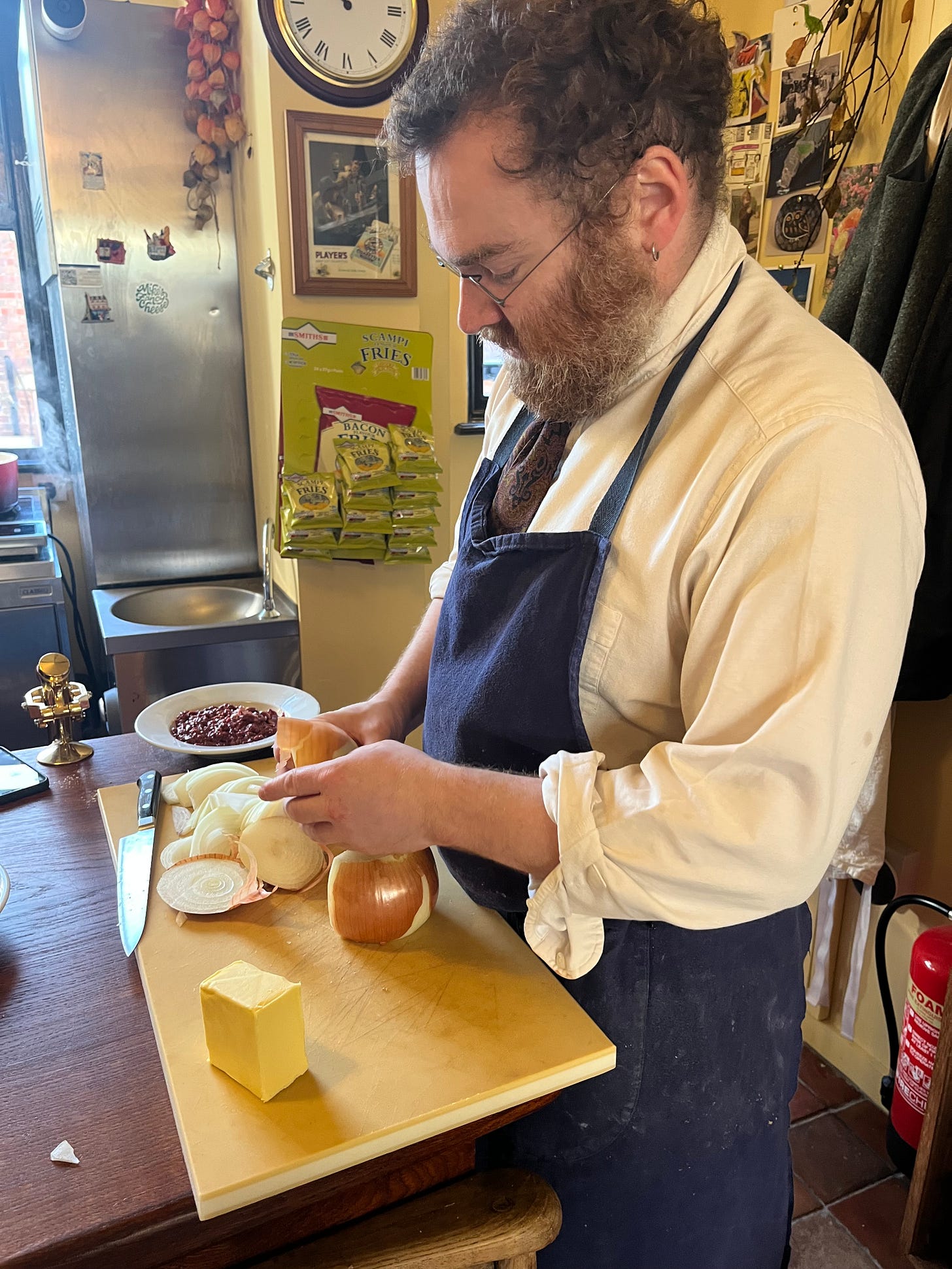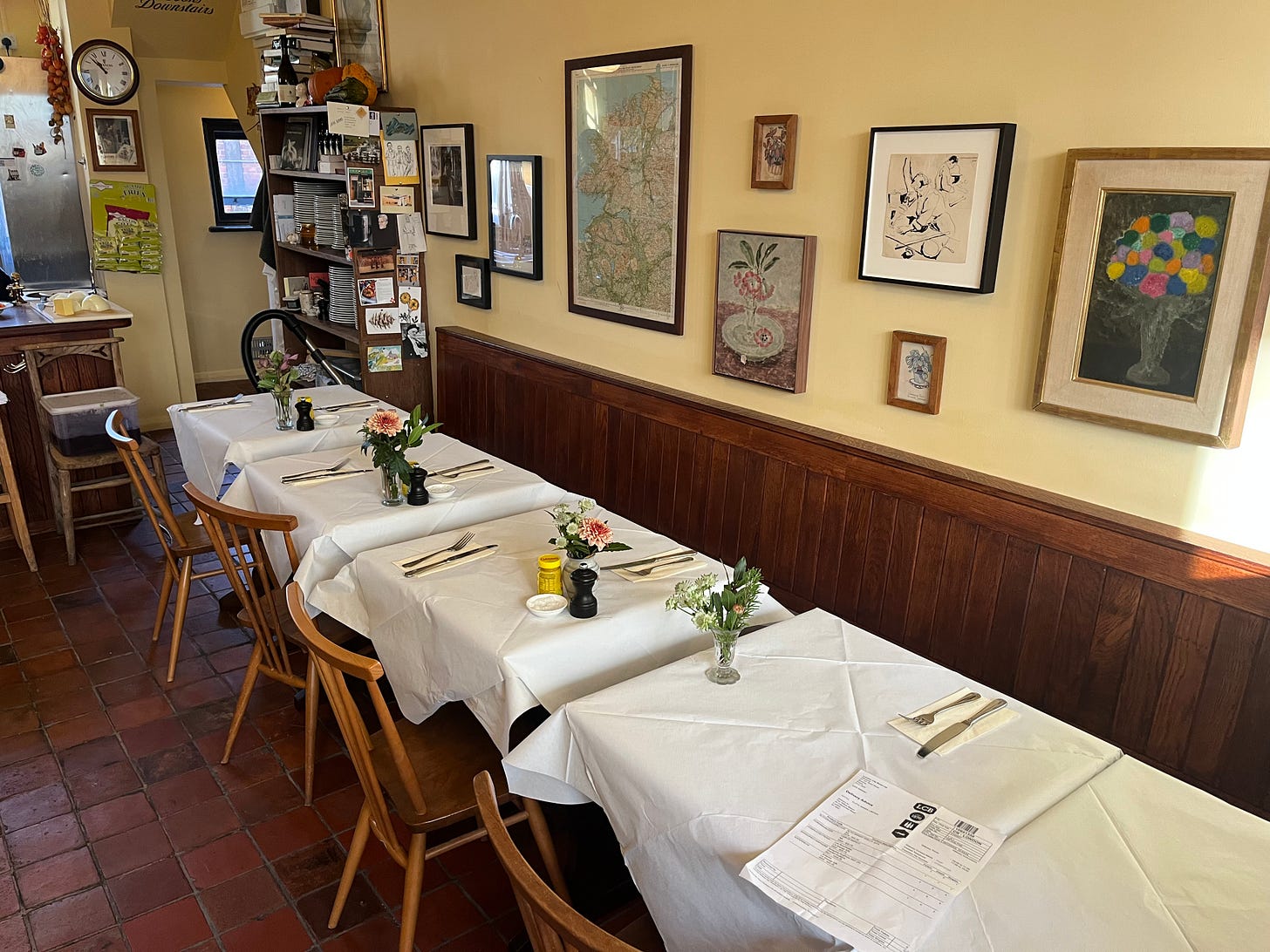Hugh Cocoran’s The Yellow Bittern is a restaurant with a difference. It’s tiny, with just 18 covers, a menu chalked on a blackboard, a wine list that is largely in Hugh’s head, takes cash only and reservations by phone or post. It doesn’t have a website, although Hugh does post a bit on Instagram.
It was on that platform, a few weeks before Christmas 2024, that he made what I reckon was a pretty reasonable plea but some took offence. The gist was this: if you go to a restaurant don’t sit for hours over one dish and spend very little. If you don’t have wine, at least have a pudding. There was uproar in certain quarters and some restaurateurs condemned his temerity in pointing out that restaurants – especially very small independent ones – need customers to spend a few bob.
When I dropped in to see him in early December, I wasn’t entirely sure what to expect. Would he be prickly and taciturn? Would he be what used to be called an Angry Young Man? He seemed pleasant on the phone, but I approached The Yellow Bittern, where Caledonian Road merges with the hurly burly of King’s Cross, on a chilly morning, and with some trepidation.
In fact, Hugh was exceptionally pleasant, a small, bearded, bespectacled Belfast native with an enthusiasm not just for good food but also, judging by the décor, Karl Marx, Brendan Behan and Guinness.
Now aged 35, he runs The Yellow Bittern with his partner Lady Frances Armstrong-Jones, daughter of the late Lord Snowdon and his second wife, Lucy, daughter of Donald Davies of Dublin, whose fashion business operated from the stables of Charleville, a grand house near Enniskerry. (Lingard Goulding tells me that he and his neighbour, Lucy Davies, as very small children, used to go to school together in a pony and trap). Snowdon’s mother, Anne Messel, married as her second husband, the late Earl of Rosse of Birr Castle and were parents of Brendan Rosse.
“I left school early,” Hugh told me. “I had various jobs, worked on building sites, got involved in the trade union movement and community work with the Irish language and somehow along the way I got into cooking. I ended up in the kitchen of the Merchant Hotel in Belfast. I had a lot of friends from the Basque country and one of them asked me to go back home with him and that’s where I really learned to cook. It was supposed to be for the Summer but I actually stayed for six years!”
“I had to learn how to organise a kitchen,” he recalls, “and the approach to cooking was different from what I’d been used to. But over time, I developed a reputation and I ended up cooking in Paris for three or four years before stints in America, Italy, Germany. People invited me into their restaurants to cook. Then I moved to London to be with my partner, Frances.”
At this point they decided that they wanted to open a combined restaurant and bookshop, and Oisín Davies, who Hugh had met when working in Paris, came on board to manage the latter (and to make the brown soda bread). The stock, all second-hand, is mainly related to food, art, photography and Irish interest. I can think of no better aperitif than a browse in the basement before luncheon, as flagged in the window, upstairs.
“At first the idea was to just cook up a good stew and serve some wine in a bookshop,” he says. “And we ended up with this. There was no PR, no website, just the simplest thing possible. Of course, we wanted people to come but we didn’t do any hype. The idea was to create a restaurant with good cooking – not unusual in London – but with real personality.”
They have certainly achieved that since opening in October 2024 and the media response has been generally positive. Jay Rayner in The Observer did not encourage readers to beat a path to the door. Hugh has his own theory as to why Rayner was so negative; my own view is that he simply didn’t understand the place. “He seemed to have had a great time,” recalls Hugh, “and then the review was negative”. Giles Coren, in The Times, however, loved it and Nick Lander, writing on the Jancis Robinson website absolutely got it.
“The food is what I’d call Hiberno-French or maybe Franco-Irish. It’s not ‘modern British’,” Hugh says with emphasis. And on the day I dropped in for a chat he was preparing a typically Franco-Irish menu – it’s lunch only and cash only – of guinea fowl, proper sausages with red wine gravy and mash, and rabbit with a cream and mustard sauce. A Normandy apple pie had just emerged from the oven and whole Irish cheeses stood ready to help with finishing up whatever wine the discriminating customer would have (including the glorious blue Young Buck from Newtownards).
At that time, there was no wine list. The idea was that you would tell Hugh how much you wanted to spend and what you generally like and he would select a bottle from his extensive cellar of natural (aka minimal intervention) wines. This, for me, definitely indicates personality in a restaurant – although I’m somewhat agnostic about natural wines – but it certainly riled Jay Rayner.
Now, Hugh has relented but only up to a point and there is a blackboard listing a few wines, all available by the bottle or the glass (and the by-the-glass prices strike me as particularly reasonable). This is “for those that want it,” he says. “The disadvantage is that you have to pay the real price (rather than the cheaper price I normally give) and you have nine wines rather than the 120- odd in the cellar. Alternatively, you can ask me”.
He likes to champion small, meticulous producers many of whom he knows personally and he argues passionately that they need to be rewarded by people prepared to pay prices for that reflect the scale and the quality.
Well, I know what I’d do.
Hugh raises an interesting point: essentially that a lot of people expect a restaurant to be all things to all customers. And, we’ve all been in places that set out to be that: bland, big, highly commercial. “What If I don’t drink, don’t eat meat, need gluten free,” he says. “Well, don’t come to a tiny restaurant like this! I don’t go to a Bangladeshi restaurant that doesn’t serve alcohol and complain that I want a drink. I go for a really good curry!”
I’ll leave the last word to Giles Coren: And for the record, I thoroughly approve of the Yellow Bittern. In a world of bland crap, global chains, celebrity chefs, tasting menus, online reservations, inclusive service, TopJaw, small plates and multizillion-dollar refurbs, I think a bunch of Irish kids round the back of King’s Cross saying, “Screw yous, this is how we do it,” is the most refreshing thing I’ve seen in years.







